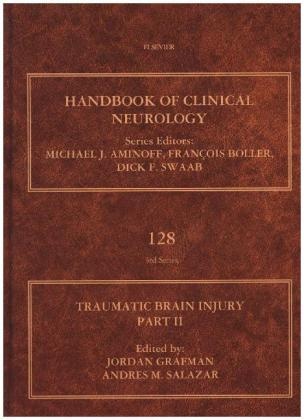Read more
The Handbook of Clinical Neurology volumes on Traumatic Brain Injury (TBI) provide the reader with an updated review of emerging approaches to TBI research, clinical management and patient rehabilitation. Chapters in Part II offer coverage of clinical sequelae and long-term outcome, brain plasticity and long-term risks, and clinical trials. Contemporary investigations on blast injury and chronic traumatic encephalopathy are presented, making this state-of-the-art volume a must have for clinicians and researchers concerned with the clinical management, or investigation, of TBI.
List of contents
Section 6 Clinical Sequelae and Long-Term Outcome
29. Predicting Outcome after Traumatic Brain Injury
30. Movement disorders secondary to craniocerebral trauma
31. Language impairments in traumatic brain injury: a window into complex cognitive performance
32. Connecting clinical and experimental investigations of awareness in traumatic brain injury
33. Post-Traumatic Epilepsy
34. Autonomic Dysfunction Syndromes after Acute Brain Injury
35. Sleep in traumatic brain injury
36. Post traumatic headaches
37. Traumatic brain injury and cognition
38. Mood disorders
39. Post-traumatic stress disorder and traumatic brain injury
40. Long term functional outcomes and psychosocial consequences of traumatic brain injury
41. Sequelae in Children: Developmental Consequences
Section 7 Brain Plasticity and Long-Term Risks
42. Cellular and Molecular Neuronal Plasticity
43. Traumatic brain injury and reserve
44. Traumatic brain injury and late-life dementia
45. Genetic factors in traumatic brain injury
Section 8 Conducting Clinical Trials in Traumatic Brain Injury
46. Ethical and Regulatory Considerations in the Design of Traumatic Brain Injury Clinical Studies
47. Design of Acute Neuroprotection Studies
48. Design of brain injury rehabilitation treatment research
49. The ebb and flow of traumatic brain injury research
About the author
Dr. Grafman has been the director of Brain Injury Research at the Shirley Ryan AbilityLab ((SRALab)formally known as the Rehabilitation Institute of Chicago) since 2012 and is on faculty at Northwestern University’s Feinberg School of Medicine in the Departments of Physical Medicine and Rehabilitation, Neurology, Psychiatry and Behavioral Sciences, and the Cognitive Neurology and Alzheimer’s Disease Center as well as the Department of Psychology in the Weinberg College of Arts and Sciences. Before joining the SRALab, Dr. Grafman was briefly director of Traumatic Brain Injury Research at the Kessler Foundation in West Orange New Jersey. Prior to that appointment in 2011, Dr. Grafman was Chief of the Cognitive Neuroscience Section at the National Institute of Neurological Disorders and Stroke in Bethesda, Maryland for many years. His investigation of brain function and behavior contributes to advances in medicine, rehabilitation, and psychology, and informs ethics, law, philosophy, and health policy. His study of the human prefrontal cortex and cognitive neuroplasticity incorporates neuroimaging and genetics, an approach that is expanding our knowledge of the functions of the human frontal lobes, as well as the effects of neurological disorders that impair frontal lobe brain function.Andres M. Salazar, MD, is CEO, Scientific Director and cofounder of Oncovir, Inc., a pharmaceutical company developing the immunomodulator, Hiltonol® (Poly-ICLC). He is a retired US Army Colonel and formerly Professor of Neurology at USUHS. He was Director of the Vietnam Head Injury Study and Founder, Principal Investigator, and first Director of the Defense and Veterans Head Injury Program, an ongoing U.S. National Head Injury clinical management and research effort. His research background includes neurotraumatology, neurodegenerative diseases, multiple sclerosis (MS), AIDS, and Oncology. He has over 200 publications, several patents, and has conducted multiple clinical studies, including in head injury, AIDS, pilot and pivotal clinical trials of beta-interferon (Avonex) in multiple sclerosis, and clinical trials of Hiltonol® in various cancers, MS, and AIDS. Dr. Salazar is a graduate of Dartmouth College and Jefferson Medical College. He completed Neurology training at Walter Reed Army Medical Center, and a Neurovirology Fellowship at the CNSSL, National Institutes of Health, Bethesda, MD.

